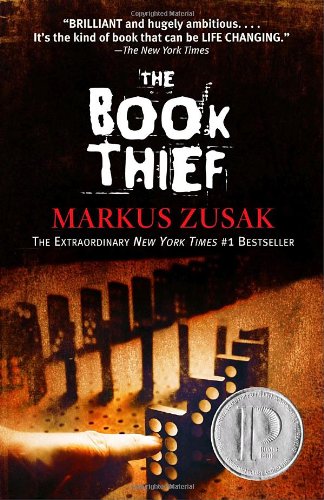All Nonfiction
- Bullying
- Books
- Academic
- Author Interviews
- Celebrity interviews
- College Articles
- College Essays
- Educator of the Year
- Heroes
- Interviews
- Memoir
- Personal Experience
- Sports
- Travel & Culture
All Opinions
- Bullying
- Current Events / Politics
- Discrimination
- Drugs / Alcohol / Smoking
- Entertainment / Celebrities
- Environment
- Love / Relationships
- Movies / Music / TV
- Pop Culture / Trends
- School / College
- Social Issues / Civics
- Spirituality / Religion
- Sports / Hobbies
All Hot Topics
- Bullying
- Community Service
- Environment
- Health
- Letters to the Editor
- Pride & Prejudice
- What Matters
- Back
Summer Guide
- Program Links
- Program Reviews
- Back
College Guide
- College Links
- College Reviews
- College Essays
- College Articles
- Back
The Book Thief by Markus Zusak
The Book Thief written by Markus Zusak is set in Germany in 1939 during Hitler’s reign of power. It follows the story of Liesel Meminger, a German child, who is also a thief of books, and sometimes food if she was hungry enough and is hanging out with the wrong people. She is adopted by a German couple, Hans and Rosa Hubermann, that have very little money, and they have to live off of pea soup for weeks on end. Then along comes Max Vandenburg, a Jewish man, looking for a place to be able to hide from the Nazi’s that were rounding up Jewish people and sending them to concentration camps. In this book we get to follow Liesel’s life as a child in Germany during Hitler’s reign and see her makes friends, some more dangerous than others.
This book is different than some you might read about World War II, because this doesn’t really have a bias to either side, it really tells you how it is and it gives you insight from both sides, German and Jewish. Though it is told through the story of a German it gives you perspective about what it must have been like for Jewish people as well. It shows how German citizens who weren’t in the Reich were treated, which wasn’t very good at all. Also it showed how “Jewish lovers”, or people who would help hide Jewish people, were treated and some parts of what would happen to them if they were caught with Jewish people in their house. But what is really interesting is that this book isn’t actually narrated by any person in the story, it’s actually being narrated by an outside character, death. The narrator, death, is almost like the grim reaper because he is the one who takes the souls of the dead to the great beyond or whatever you choose to call it. Having it not being narrated by any one person in the story gives you an interesting perspective on what may be happening.
The Book Thief deals with many difficult themes and concepts, but displays them in such a way that you can almost understand what would actually happen and how people who weren’t completely faithful to Hitler or how the Jewish people were treated. The Hubermann’s for example were a German family but no one in the house was in the Reich because Hans wasn’t trusted by the local authorities that would accept or decline people’s applications to be in the reich. So since no one in the house was in the Reich they lived rough lives where they could barely afford to have food in the house, let alone afford other things. It also shows what Jewish people had to go through at this time, a good example being how Max Vandenburg had to hide out in the Hubermann’s house, and couldn’t ever leave the basement because he could risk being seen. Also, later in the book it was talking about the marching of the Jewish people through the town on their way to a camp.
This book is definitely an unforgettable book that will make you feel a lot of different emotions all throughout the time you are reading it. The way it deals with big concepts and puts them into perspective is great, and I absolutely loved the way Zusa wrote the book and added pictures drawn by Liesel, and showed the girls development throughout the novel. Overall I absolutely loved the book, and would recommend for anyone to read it.
Similar Articles
JOIN THE DISCUSSION
This article has 0 comments.

